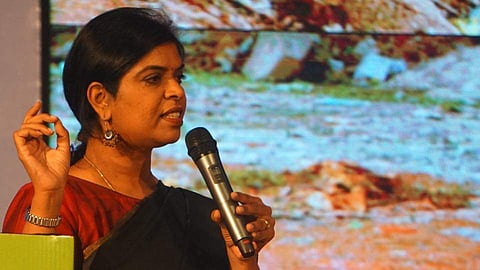

When water conservationist Kalpana Ramesh took over Prime Minister Narendra Modi's Twitter handle on International Women's Day — if you don't know what I'm talking about, the PM offered seven women achievers from across the country the chance to use his official handle — she used this opportunity to implore the whole world to be water warriors. "If each one of us decides to save rainwater, it needs very limited cost, time and effort to get this done. Roof water through filters, or simple 6-10 feet wells as rainwater pits or even the injection bores," she tweeted. Her journey too started with a simple step — rainwater harvesting and recycling grey water (the comparatively clean water from baths, sinks and so on). Slowly, she inspired her whole community in Rolling Hills, Gachibowli, Hyderabad to do the same and they haven't called for the water tanker ever since. But now, she is on to bigger things.
Learning the ropes
Born and brought up in Bengaluru, Kalpana — an architect by profession - first started working with bodies like the Hyderabad Metropolitan Water Supply and Sewerage Board (HMWSSB) and other enthusiasts from around the city to understand the ground reality. "We did not want to go big right away, we wanted to start a change in a decentralised fashion," says the water warrior. She started working with different communities, revamped more than 200 bores and conducted several awareness campaigns. Take, for example, the Waterpreuners Workshop she recently organised at Silver Oaks International School. In two months, 250 students from classes VI and VII were taken to step wells and polluted lakes and were taught about the existing and looming water problem. "The focus was on ground-learning," says Kalpana, who has an Architecture degree from BMS College of Engineering, Bengaluru, adding, "It's not about the global data, it's all about going local."
How does Kalpana inspire people to join in her efforts to conserve water, we wonder. "It is difficult to educate the educated," she laughs and adds, "Everyone questions your right but no one talks about their duties. I encourage them to participate first and then complain later." Her non-confrontational and committed attitude also helps the cause. "Just think about it. We deal with urban floods. If we start doing water harvesting in public spaces, especially in parks, we could save ourselves so much trouble," she suggests.
Eyes forward
The plan, Kalpana reveals, is to go basin by basin, inspired by Barcelona's Superblocks model that restructured the typical urban road network for more mobility. "We have divided the city into 96 basins and we work on that," she explains. She wants to create one model that can serve as inspiration for all the other areas to replicate. On her mind is also a mobile water museum that can travel to different communities and involve people in mapping and understanding their own groundwater levels. "When you involve the community, problems are solved. You are the problem but you could be the solution too," she concludes emphatically.
